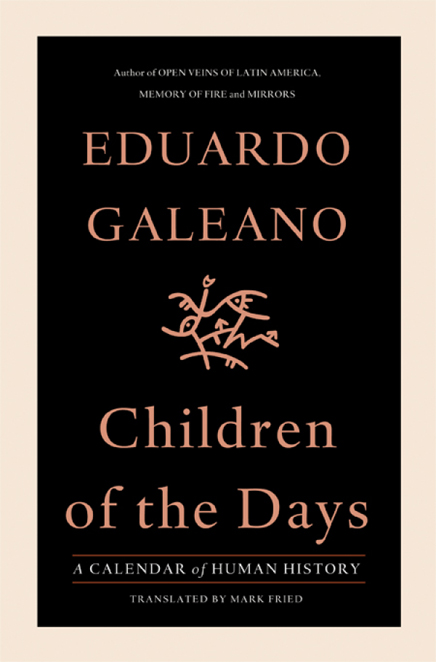Children of the Days
Read Children of the Days Online
Authors: Eduardo Galeano




A Calendar of Human History
Eduardo Galeano
Translated by Mark Fried
Â
Â
Â


Â
Copyright © 2013 by Eduardo Galeano
English translation copyright © 2013 by Mark Fried
Originally published in the Spanish language in 2012 by Siglo XXI Editores (Argentina) and Ediciones del Chanchito (Uruguay).
Collages by Eduardo Galeano
Published by Nation Books,
A Member of the Perseus Books Group
116 East 16th Street, 8th Floor
New York, New York 10003
Nation Books is a co-publishing venture of the Nation Institute and the Perseus Books Group
All rights reserved. No part of this book may be reproduced in any manner whatsoever without written permission except in the case of brief quotations embodied in critical articles and reviews. For information, address the Perseus Books Group, 250 West 57th Street, 15th Floor, New York, NY 10107.
Books published by Nation Books are available at special discounts for bulk purchases in the United States by corporations, institutions, and other organizations. For more information, please contact the Special Markets Department at the Perseus Books Group, 2300 Chestnut Street, Suite 200, Philadelphia, PA 19103, or call (800) 810-4145, ext. 5000, or e-mail
[email protected]
.
Cataloguing-in-Publication data for this book are available from the Library of Congress.
ISBN: 978-1-56858-971-8 (e-book)
10 9 8 7 6 5 4 3 2 1
I cannot thank all of the friends who made this book possible or the authors of the many works I consulted. These friends and authors would not fill a stadium, but almost.
However, I can dedicate the end result to those who had the patience to read and comment on the early drafts, which yearned to be final drafts and turned out to be almost final, because there was always something to correct or change, to take out or put in: Ramón Akal, Mark Fried, Karl Hübener, Carlos Machado and Héctor Velarde.
This book is for Helena Villagra. No words needed.
â
In Montevideo, at the end of the year 2011
                     Â
And the days began to walk.
                     Â
And they, the days, made us.
                     Â
And thus we were born,
                     Â
the children of the days,
                     Â
the discoverers,
                     Â
life's searchers.
                          Â
â
GENESIS
, according to the Mayas


January 1
T
ODAY
Today is not the first day of the year for the Mayas, the Jews, the Arabs, the Chinese or many other inhabitants of this world.
The date was chosen by Rome, imperial Rome, and blessed by Vatican Rome, and it would be an overstatement to say that all humanity celebrates today as the crossing from one year to the next.
That said, today we ought to acknowledge that time treats us rather kindly. Time allows us, its fleeting passengers, to believe that this day could be the very first day, and it gives us leave to want today to be as bright and joyous as the colors of an outdoor market.
F
ROM
F
IRE TO
F
IRE
On this day in 1492 Granada fell, and with it fell Muslim Spain.
Triumph of the Holy Inquisition: Granada was the last Spanish kingdom where mosques, churches and synagogues could live side by side in peace.
That same year the conquest of America began, when America was still a mystery without a name.
And in the years that followed, in distant bonfires, the same flames would consume the books of Muslims, of Jews and of America's indigenous peoples.
Fire was the only fate for words born in hell.
M
EMORY ON
L
EGS
On the third day of the year 47 BC, the most renowned library of antiquity burned to the ground.
After Roman legions invaded Egypt, during one of the battles waged by Julius Caesar against the brother of Cleopatra, fire devoured most of the thousands upon thousands of papyrus scrolls in the Library of Alexandria.
A pair of millennia later, after American legions invaded Iraq, during George W. Bush's crusade against an imaginary enemy, most of the thousands upon thousands of books in the Library of Baghdad were reduced to ashes.
Throughout the history of humanity, only one refuge kept books safe from war and conflagration: the walking library, an idea that occurred to the grand vizier of Persia, Abdul Kassem Ismael, at the end of the tenth century.
This prudent and tireless traveler kept his library with him. One hundred and seventeen thousand books aboard four hundred camels formed a caravan a mile long. The camels were also the catalogue: they were arranged according to the titles of the books they carried, a flock for each of the thirty-two letters of the Persian alphabet.
L
AND
T
HAT
A
TTRACTS
Today in 1643, Isaac Newton was born.
Newton never had any lovers as far as we know, male or female.
Terrified of infections and ghosts, he died a virgin, touched by no one.
But this fearful man had the courage to investigate and reveal
the movement of the heavenly bodies,
the composition of light,
the speed of sound,
the conduction of heat
and the law of gravity, the earth's irresistible force of attraction, which calls to us and by calling reminds us of our origin and our destiny.
L
AND
T
HAT
S
PEAKS
George Washington Carver dreamed about God.
“Ask of me whatever you wish,” God offered.
Carver asked Him to reveal the secrets of peanuts.
“Ask the peanut,” God told him.